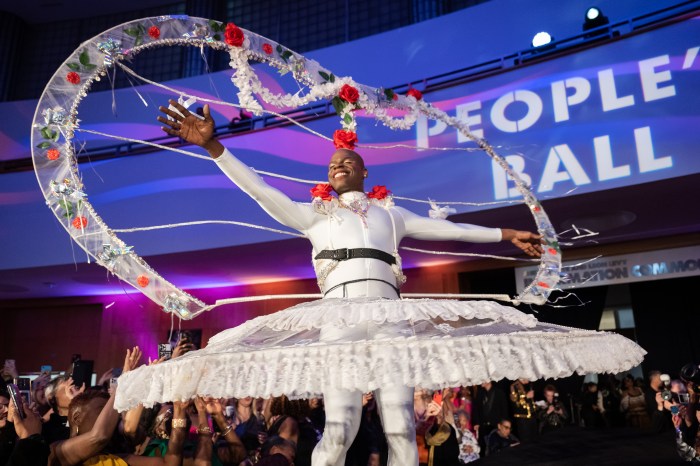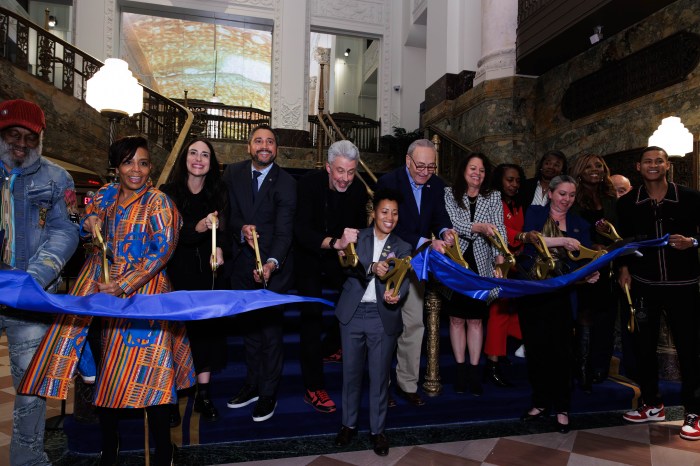One World Symphony continues exploring “Contrasts and Controversy” — this season’s theme — with a production of Benjamin Britten’s classic “Peter Grimes: The Divided Self” in Brooklyn Heights’ Church of St. Ann and the Holy Trinity on Jan. 25. The opera explores several hot button themes, including homosexuality and religious fundamentalism.
One World Symphony conductor Sung Jin Hong’s ambitious decision to present a semi-staged production of “Grimes” — replete with a 55-member orchestra — wasn’t intended to challenge the Metropolitan Opera (which unveils its own starry new production in a few weeks); it was linked to the acclaim One World Symphony garnered when presenting another 20th century operatic masterwork last season: Richard Strauss’s “Salome.”
“It was a huge success, so I wanted to do another 20th century masterpiece. And I thought ‘Grimes’ would be a wonderful project,” said Hong. “We also develop our programs with a theme, and this season it’s ‘Contrasts and Controversy.’ ‘Peter Grimes’ definitely fills the bill.”
Despite the provocative material, “Peter Grimes” will be welcomed into the church, according to Rev. Angela Askew.
“Sung’s programming is a bit edgy, but that is what is needed when you’re in his position,” she told GO Brooklyn, calling One World Symphony a “fabulous orchestra.” “We are an Episcopal church, and it is a very open, welcoming and inclusive sort of Christian denomination. We have no problem on our part with his choice of material, certainly [‘Peter Grimes’] is a classic.”
Britten’s opera — which premiered in London on June 7, 1945, immediately after the Second World War — centers on the title character, a fisherman living alone in a coastal village. The townspeople distrust him, thinking he is directly responsible for the recent death of a young apprentice. His lone friends — local schoolmistress Ellen Orford and old Captain Balstrode — cannot get through to Grimes and, after his latest apprentice mysteriously dies, the fisherman goes out to sea, never to return.
Britten and his companion, tenor Peter Pears (who sang the title role at the premiere), were both homosexual and pacifist, leaving no doubt that the opera’s main theme — the oppression of outsiders by an unforgiving society — was pertinent to them in their world.
“Musicologists have discussed many things about the opera — the homosexuality, the anti-war and pacifist themes, notably,” Hong noted. “The work has been controversial since its premiere, and it still resonates — especially, for us today, the theme of fundamentalism.
“The character of villager Bob Boles is very charismatic, and he instigates his fellow villagers to go against Grimes, so it’s easy to imagine him as this leader who’s a religious fundamentalist,” Hong continued. “Although Grimes only has two friends — Ellen and the captain — even at the end, the captain suggests that Grimes commit suicide.”
One World Symphony fans will be pleased to see some familiar faces in the “Grimes” cast.
“Our soloists, fantastic singers and performers all, have sung with us before,” said Hong about the production, directed by Rod Gomez. “Before people get to hear them at big stages in New York and elsewhere, our audiences can experience these up-and-coming singers with us.” (There are alternating casts: on Jan. 25 in Brooklyn, Caleb Stokes sings the role of Peter Grimes; on Jan. 27 in Manhattan, Jon Morrell sings Grimes.)
“What’s most important for a great opera is great music, and ‘Peter Grimes’ is so symphonic in its sound,” he said. “There are really three main protagonists: the soloists, the chorus and the orchestra, which really sets more than the mood — through the orchestra, Britten clearly shows where Grimes’s mindset is throughout the opera. He may be guilty because he’s responsible for what happened to his apprentices — but he doesn’t act that way, because he feels like an outcast.”
In addition to the orchestra, the chorus is also featured prominently.
“Choruses are always underappreciated, and the role of the chorus in ‘Grimes,’ like the one in ‘Carmen,’ is integral to the drama: the choral singers may have the most important role in the entire opera!” exclaimed Hong. “Our chorus members were so excited to face this challenge, and their music is even more challenging than the soloist parts in some ways.”
Askew claimed that Hong and the One World Symphony are more than ready to take on the challenging work.
“Sung has the ability to weld together a band of musicians that haven’t played together for more than 20 minutes — I have watched him in rehearsal and perform here — and he has the ability to draw the best out of every single player — and the group as a whole — and do it very fast,” said Askew. “It is quite phenomenal to see.”
Britten’s breakthrough opera began the 20th century’s greatest operatic career and Hong spoke of “Grimes” reverently.
“To me, it’s one of the most moving works in all of music history,” said Hong. “It’s definitely a spiritual work, and it reminds me of Bach’s oratorios, since Bach treated his chorales as interludes, and Britten does the same with the interludes in his opera. It’s no coincidence that they were both church musicians.”
Hearing this powerful opera at the Church of St. Ann and the Holy Trinity underscores the spiritual aspect of “Peter Grimes.”
“At St. Ann’s, there’s a very open stage area, so it’s going to be a grand music drama in a very intimate setting,” Hong pointed out. “There won’t be a bad seat in the house — every seat will be a VIP seat.”
One World Symphony presents Benjamin Britten’s “Peter Grimes: The Divided Self” at the Church of St. Ann and the Holy Trinity (157 Montague St. between Clinton and Henry streets in Brooklyn Heights) at 8 pm on Jan. 25, and at Ansche Chesed Synagogue (251 West 100th St. at West End Avenue in Manhattan) at 4 pm on Jan. 27. Tickets are $40, and $30 for students and seniors. For more information, visit oneworldsymphony.org or call (718) 462-7270.























